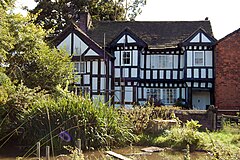Bredbury
| Bredbury | |
|---|---|
 Goyt Hall |
|
| Bredbury shown within Greater Manchester | |
| Population | 13,593 (2011) (Bredbury Ward) |
| OS grid reference | SJ925915 |
| • London | 157 miles (253 km) SSE |
| Metropolitan borough |
|
| Metropolitan county | |
| Region | |
| Country | England |
| Sovereign state | United Kingdom |
| Post town | STOCKPORT |
| Postcode district | SK6 |
| Dialling code | 0161 |
| Police | Greater Manchester |
| Fire | Greater Manchester |
| Ambulance | North West |
| EU Parliament | North West England |
| UK Parliament | |
Bredbury is a suburban town within the , in Greater Manchester, England, located 7.9 miles (12.7 km) south east of Manchester, 1.8 miles (2.9 km) east of and 3.2 miles (5.1 km) south west of Hyde. At the 2001 census it had a population of 15,126. At the 2011 census the population had decreased to 13,593.
The village reaches to the lower southern slopes of Werneth Low, an outlier of the Peak District between the valleys of the River Tame and River Goyt, head-waters of the River Mersey.
The area must have been unattractive to the Brigantes settlers in pre-Roman Britain, with its bleak hilltop, the heavy clay soil of the intermediate land probably covered by trees and becoming marshy where the slopes flattened out, and the swampy valley floors. The rivers flowed more fully before their waters were dammed in the 19th century to supply Manchester, Stockport and other towns. However, where the valley of the River Goyt narrows at New Bridge, passage was possible, and here an ancient highway entered the village to proceed along the higher land to the north east.
The Romans surveyed and constructed a road between the forts of Mamucium (Manchester) and Ardotalia (Melandra Castle at Gamesley) over this ancient track and this in turn became an 18th-century turnpike road and the Liverpool to Skegness trunk road, the A560.
Some years ago a Roman coin was dug up on the edge of the road between Bredbury railway station and St Mark's Church. The coin long antedates any Roman occupation of this part of the country, and may either have been lost when held as a souvenir or have been brought over from the continent in the course of trade.
...
Wikipedia

